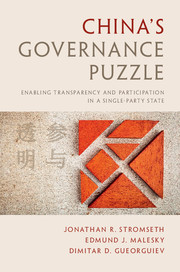Book contents
- China’s Governance Puzzle
- China’s Governance Puzzle
- Copyright page
- Dedication
- Contents
- Figures
- Tables
- Preface
- Abbreviations
- 1 China’s Approach to Governance Reform
- 2 Concept, Chronology, and Drivers of Transparency Reform
- 3 Transparency and Corruption: Analysis of Variation Within China and Hypothesis Testing
- 4 Comparing Approaches to Combating Corruption: The Guangdong and Chongqing Models
- 5 Concept, Chronology, and Drivers of Participation Reform
- 6 Participation and Compliance: Analysis of Variation and Hypothesis Testing
- 7 Making Policy in Public: A Comparison of Three Chinese Provinces
- 8 The Road Ahead
- Select Bibliography
- Index
8 - The Road Ahead
Published online by Cambridge University Press: 23 March 2017
- China’s Governance Puzzle
- China’s Governance Puzzle
- Copyright page
- Dedication
- Contents
- Figures
- Tables
- Preface
- Abbreviations
- 1 China’s Approach to Governance Reform
- 2 Concept, Chronology, and Drivers of Transparency Reform
- 3 Transparency and Corruption: Analysis of Variation Within China and Hypothesis Testing
- 4 Comparing Approaches to Combating Corruption: The Guangdong and Chongqing Models
- 5 Concept, Chronology, and Drivers of Participation Reform
- 6 Participation and Compliance: Analysis of Variation and Hypothesis Testing
- 7 Making Policy in Public: A Comparison of Three Chinese Provinces
- 8 The Road Ahead
- Select Bibliography
- Index
Summary
Beyond the headline findings, five additional themes emerged from our research. First, Chinese governance reforms must be understood on their own terms and in the context of the Chinese policymaking process. Second, Chinese reforms were only partially successful. Many were not fully implemented or failed to achieve the full extent of the outcomes envisioned for them. Third, there is no single Chinese model; approaches to governance varied widely over time and across Chinese provinces. Fourth, reforms were most successful when accompanied by other reform initiatives. Fifth, Chinese governance reforms were intentionally not embedded in permanent and self-reinforcing institutions. After reviewing these themes, we reflect on the implications of our research for the future of the Chinese regime. Our analysis draws from the burgeoning literatures on authoritarian institutions, regime transition, and democratization. We offer the provocative perspective that these reforms may pave the way for successful democratization in two respects. First, the legacy of a high-quality bureaucracy and strong governance has been shown to influence the success of democratic transitions. Second, enhanced legitimacy may enable the Chinese Communist Party (CCP), like other single-party regime, to concede from a position of strength – allowing multiparty competition because it believes it can win in a free and fair contest.
- Type
- Chapter
- Information
- China's Governance PuzzleEnabling Transparency and Participation in a Single-Party State, pp. 276 - 299Publisher: Cambridge University PressPrint publication year: 2017



